PROMETHEUS project presented in the 4th HEI Initiative Co-creation workshop
PROMETHEUS team attended the 4th Co-Creation Workshop for Cohort 1 & 2 projects on 10 -11 May, 2023.
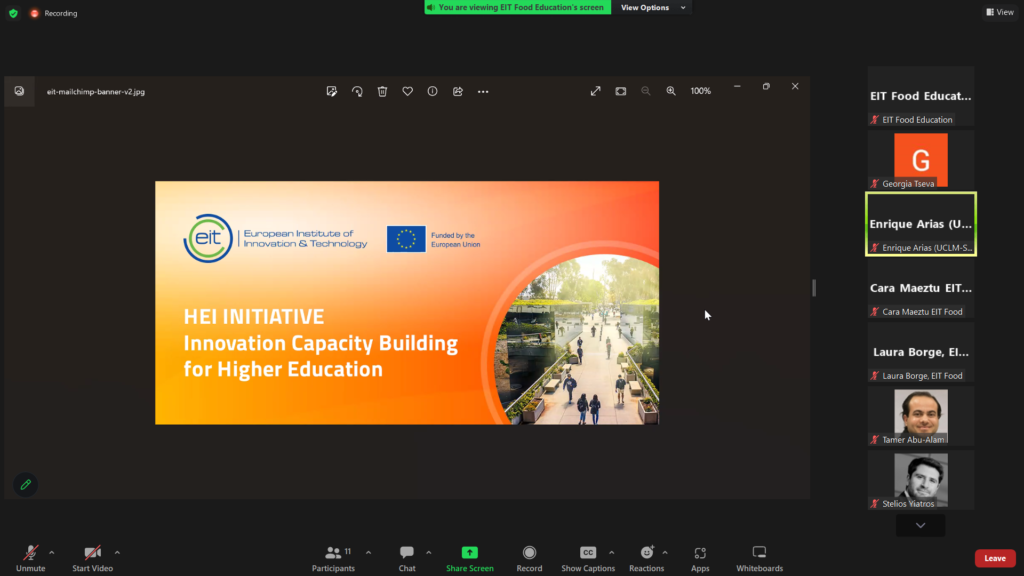
Co-creation Workshop Aims
The overall purpose of the 2 days online workshop was to create a space where the EIT HEI Initiative projects could learn from each other and discuss ideas to support each other in the achievements of the KPIs, objectives and domains where the least change has been achieved. Key point for the organisation of the workshop has been the fact that, based on Phase 1 Review, Domain 5 (Knowledge Sharing) and Domain 3 (Contributing to developing innovations and businesses) saw the least significant change. HEI cohort 1 projects were invited to present lessons learned and best practices during their implementation as a way for Cohort 2 projects to explore new ideas and practices.
To achieve this aim, the Co-Creation Workshop was divided into four sessions. Each session was structured around a blended format including:
- Introduction with experts identified and selected by the KICs for their distinctive insights on the domains that have seen the least change (domain 3 and domain 5);
- Introduction with HEI cohort 1 projects for their lessons learned and recommendations on the domains that have seen the least change (domain 3 and domain 5) ;
- Breakout room discussions with participants to share experiences and best practices across any of the four domains;
- Plenary discussions to share the main findings from the breakout room discussions or hear more inspirations.
Co-creation Workshop Day 1
On May 10, the Workshop began with Welcome and Introduction by Laura Borge, Education Programme Manager at EIT Food.
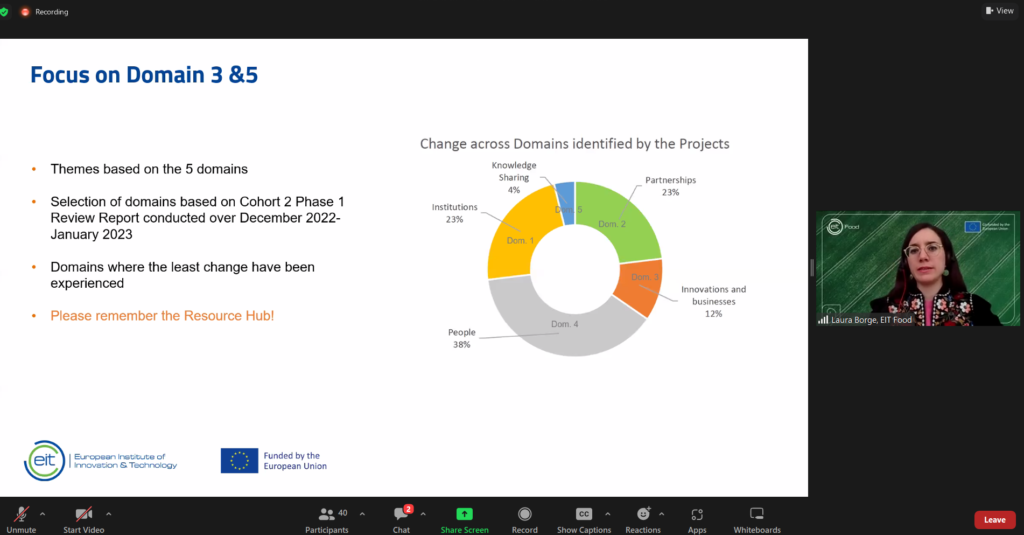
Two keynote presentations followed and in particular:
- EIT HEI Initiative Portfolio: Exploring and finding synergies by Pamela Ragazzi, Learning Programs Orchestrator at EIT Climate-KIC
- Domain 3: Simon Brown, CEO at P2T Consulting
Afterwards, two Cohort 1 projects presented key lessons learnt:
- Domain 3: Tandem+ and EUACCEL, EIT Urban Mobility by Bárbara Gabriel, University of Aveiro and Pavlina Vujovic, Institute of HM University of Applied Sciences
- Domain 5: CHIC, EIT Climate by Ivana Vukam Head of Technology Transfer Office at the University of Split
Maarten van der Kamp, EIT Food Education Director summarised Workshop Day 1 key conclusions in a Plenary Session while participants renewed their date for Day 2 of the Workshop.
Co-creation Workshop Day 2
Day 2 of the Co-creation Workshop started with Welcome and Introduction by Laura Borge, Education Programme Manager at EIT Food.
PROMETHEUS presented in the Workshop
Next, Georgia Tseva, National & EU Projects Coordinator at Crowdpolicy and Dissemination Manager for the PROMETHEUS project made an overall presentation of the project focusing on good practices in the implementation of the project and in Domains 3 & 5. Her presentation explicitly highlighted that PROMETHEUS project is a “system-based project”, in a sense of creating permanent – ever evolving digital platforms and mechanisms to support Innovation and Entrepreneurship within a wide ecosystem. The project initiatives comprise academia, industry and the society in a guided / curated fruitful interaction to foster innovation and target it on declared business and/ or societal needs for young talent to work on.
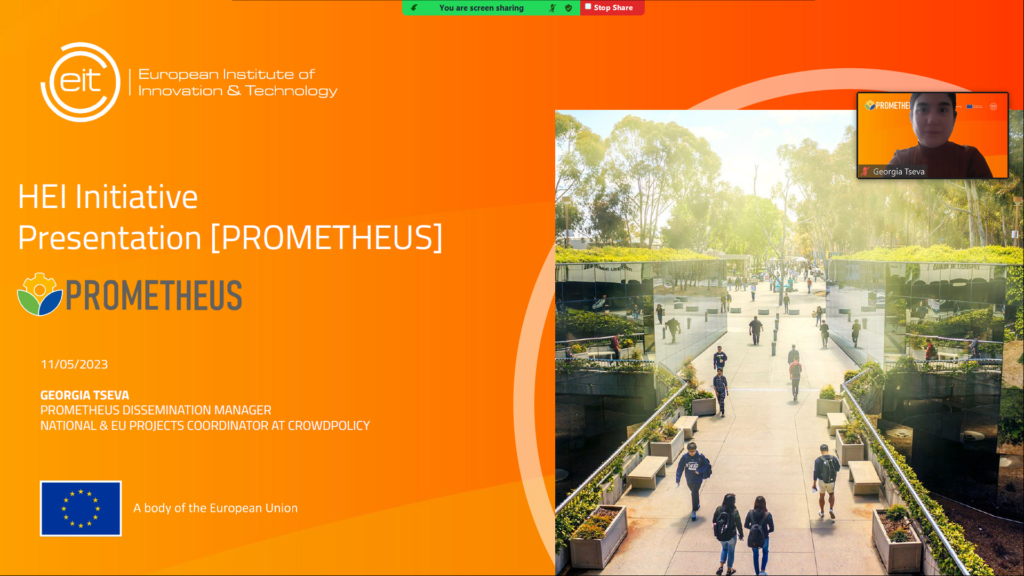
Subsequently, Georgia Tseva presented four key support structures for entrepreneurship and business development:
- The PROMETHEUS Entrepreneurship Acceleration Platform: a platform launched in November 2021 as an academic accelerator of innovation and entrepreneurship ideas from the participating HEI’s students and staff, while also assembling activities to develop and nurture businesses in the areas of Digital Transformation, Circular Economy and Sustainable Development. The ability of the platform to provide students and organisations a common ground to solve existing problems faced by organisations raises the interest of organisations to the platform. This is a key challenge in terms of the sustainability of an entrepreneurship digital tool, as the PROMETHEUS team has experienced within the project. The Platform was successfully used in the implementation of the PROMETHEUS International Startup Competition 2022 increasing the engagement and interest of students and academic staff.
- The International Start-up Competition 2022 embraced early stage business ideas leading to either innovative start-ups or social entrepreneurship approaches assisted to be scaled into businesses in the field of Digital Transformation and Sustainable Development. The Competition was concluded in December 2022. A key outcome of the competition has been the creation of the PROMETHEUS seed financing mechanism. Its aim is to provide basic financial incentives needed to advance new business ideas. In its effort to financially support these innovative projects, PROMETHEUS project combines the allocation of a secured financing capital with structured mentoring support during and/ or after the implementation of the competition. A key challenge in this effort has been the fact that such processes often take time and need coherent long-term support.
- PROMETHEUS has been also involved in several activities that revolve around the development of opportunities for cooperation activities inside HEI’s aiming at entrepreneurship support. One key action has been PROMETHEUS participation in the 10th International School on Digital Innovation and Start-up Entrepreneurship – eBizz2022. There, targeted entrepreneurs and marketers of all ages assisted participants to grow their business ideas in an international environment, collaborating in teams. PROMETHEUS experts actively provided keynote speeches and dedicated mentoring activities to talented youngsters working in teams in order to come up with innovative business plans. This summer, PROMETHEUS will participate in the 11th International School on Digital Innovation and Start-up Entrepreneurship – DigiBus2023.
- Experiencing the need for targeted collaborations in the field of supporting businesses and innovation, PROMETHEUS project has collaborated with Cohort 2 OASIS project with the aim to build a knowledge transfer structure. Having in mind that often the acceleration of multiple open innovation activities might not coincide with more mature business ideas/ startups, one key lesson learned has been the importance of sharing strategic tools and experiences in the field with other stakeholders. This exchange can enable the project to achieve the maximum impact and sustainability of its outcomes and digital tools and it has been an overall principle for creating PROMETHEUS associated partners network as a structure. In particular, a knowledge transfer structure is under development with the OASIS project aiming at the exchange of access to both projects’ tools and platforms, support methodologies and deliverables. Future plans of this collaboration include participation in both projects’ future activities and synergies as well as actions for the institutionalisation of the transfer knowledge structure after the end of the project both with OASIS and other projects. As for now, the main outcome of this collaboration is that it has enabled us to study new ideas in supporting start-ups through the OASIS project Agile Methodology for Entrepreneurship Culture. This methodology has assisted us in justifying the interrelations and linkages in between different support elements and provide us with experimentation principles in reference to mentoring practices. On the other hand, providing outputs in relation to digital entrepreneurship in a circular economy enables OASIS to check its methodological context in relation to different thematic areas and propose future directions towards an innovative entrepreneurship culture.
During this session, Yeray Pescador, Headlines, EIT Food project coordinator at Universidad de Burgos highlighted relevant key challenges and aspects within their project.
Breakout Sessions
The presentations were followed by breakout sessions where projects’ representatives discussed in more detail good practices for the sustainability of their projects across the five different domains of the HEI initiative.
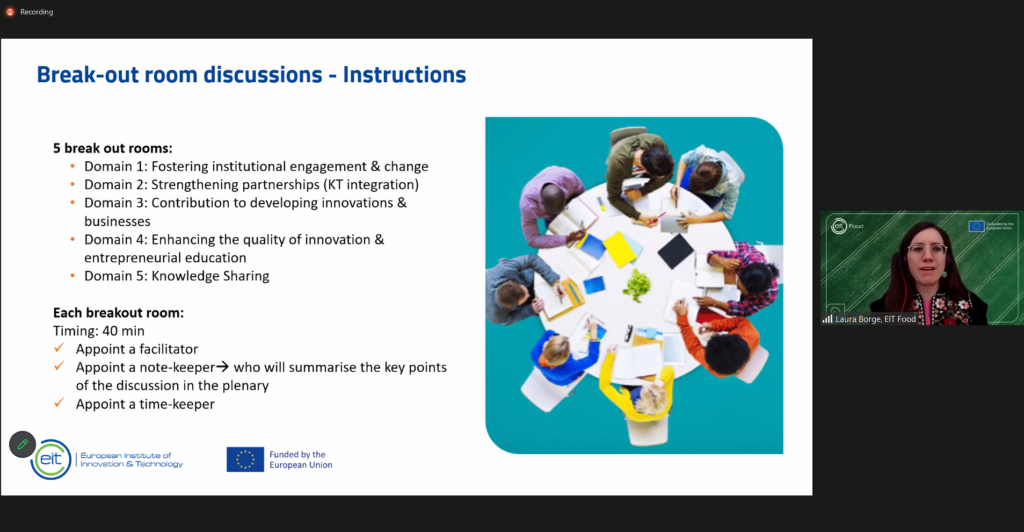
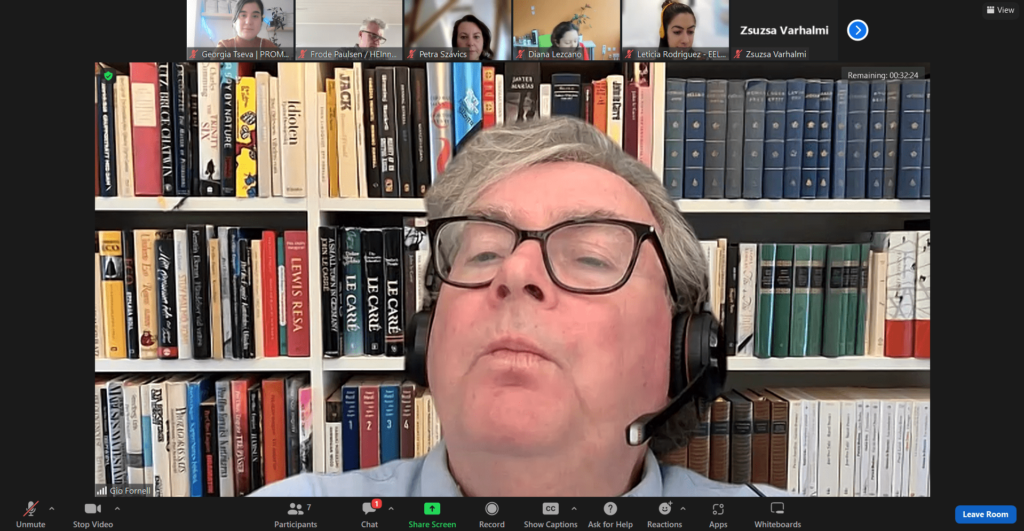
The ideas generated from the breakout sessions were further discussed in the plenary session before closure of the Workshop. There, participants highlighted the importance of new ways for engaging academic and non academic partners as well as the need for sustainable support or entrepreneurship initiatives.
Further to this, Pamela Ragazzi, Learning Programs Orchestrator at EIT Climate-KIC, introduced participants to the EIT HEI Initiative Portfolio as a way to show and enable synergies across HEI projects.
Last but not least, participants thanked the organisers for the fruitful discussions and renewed their date for the next EIT HEI Initiative Activities.
